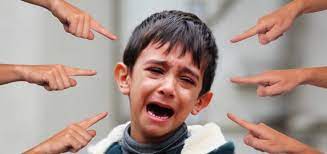
In many families, there is one member who seems to take the blame for everything that goes wrong.
This person is known as the family scapegoat, and they are often unfairly targeted by other family members for problems or conflicts within the family dynamic. Being the scapegoat can be incredibly isolating and damaging to a person's self-esteem and mental health.
In this blog post, we will explore what causes someone to become the family scapegoat, the signs to look out for, and provide some coping mechanisms for those who find themselves in this difficult position.
Defining the family scapegoat
A family scapegoat is an individual who is consistently blamed, criticized, or ostracized for the family's problems or dysfunction. The family members project their issues onto the scapegoat, making them the target of their anger, frustration, and disappointment. Scapegoating can take different forms, such as verbal abuse, physical abuse, neglect, or emotional neglect.
In a scapegoating family, the scapegoat is often seen as the "black sheep," the one who is different from others, rebellious, or challenging the family's status quo. They may be labeled as lazy, selfish, crazy, or irresponsible, regardless of their actual behavior or intentions. The scapegoat may also be used as a distraction or a buffer for the family's internal conflicts or secrets.
Being a family scapegoat can have a profound impact on one's sense of self-worth, identity, and mental health. It can lead to feelings of guilt, shame, anger, and confusion, as well as a pervasive sense of not belonging or being loved. Scapegoating can also contribute to a range of psychological problems, such as depression, anxiety, PTSD, addiction, or eating disorders.
Understanding the dynamics of scapegoating in families is an essential step towards healing and breaking the cycle of dysfunction. By recognizing the patterns of scapegoating and its effects, the scapegoat can learn to set healthy boundaries, communicate assertively, and seek support and validation from outside sources. The journey of healing from scapegoating can be long and challenging, but it is possible with the right tools and resources.
Causes of scapegoating in families
Scapegoating in families can occur for a variety of reasons, and is often linked to the dynamics and interactions within the family unit. Here are some common causes of family scapegoating:
1. Projection: When one or more members of the family are unable to accept their own faults or negative feelings, they may project these onto the scapegoat, blaming them for things that are not their fault.
2. Enmeshment: When a family is enmeshed, or overly involved with each other's lives, there may be a need for a scapegoat to deflect attention away from other issues or conflicts within the family.
3. Dysfunctional communication: When family members are unable to communicate effectively, misunderstandings and conflicts can arise, leading to scapegoating.
4. Family roles: Sometimes, certain family members are assigned roles based on their personality or behavior. For example, a child who is outspoken or rebellious may be labeled as the "troublemaker" or scapegoat.
5. Abuse or neglect: In some cases, family scapegoating can be a form of emotional or psychological abuse. Parents may use the scapegoat to take out their frustrations or insecurities on, rather than addressing the underlying issues in the family.
Understanding the underlying causes of family scapegoating is an important step in finding ways to cope with and overcome these dynamics. It is important to remember that as a family scapegoat, it is not your fault, and you deserve support and help to navigate these challenging family dynamics.
Signs of being a family scapegoat
Being the family scapegoat can be a confusing and painful experience, and often goes unnoticed or unrecognized by others. Here are some signs that you may be a family scapegoat:
1. You are constantly blamed for things that are not your fault. Your family members may unfairly pin their problems or shortcomings on you, making you the scapegoat for their own issues.
2. You are constantly criticized or belittled. Your family members may constantly nitpick at everything you do, leaving you feeling like you can’t do anything right.
3. You are isolated or excluded from family events. Your family may actively leave you out of events or gatherings, leaving you feeling like an outsider.
4. You are the subject of negative gossip or rumors within the family. Your family members may spread negative stories or rumors about you, damaging your reputation and self-esteem.
5. You are the recipient of emotional or physical abuse. Your family may take their frustration out on you in unhealthy ways, leading to emotional or physical harm.
If any of these signs resonate with you, it may be worth exploring whether you are a family scapegoat. Recognizing this pattern can be the first step in beginning to heal and build healthier relationships with your family members.
Coping strategies for family scapegoats
Being a family scapegoat can be extremely challenging and emotionally exhausting. It can lead to feelings of low self-esteem, depression, anxiety, and anger. However, it's essential to remember that you're not alone in this situation, and there are ways to cope.
Here are some strategies that can help you cope as a family scapegoat:
1. Set healthy boundaries: Establish boundaries and stick to them. It's okay to say "no" when you feel overwhelmed, and it's essential to prioritize your mental health and well-being.
2. Build a support network: Surround yourself with people who understand your situation and can offer emotional support. This could include friends, therapists, or support groups.
3. Focus on self-care: Take care of your physical, mental, and emotional needs. Exercise, practice meditation or mindfulness, and engage in activities that bring you joy and fulfillment.
4. Challenge negative beliefs: It's common for family scapegoats to believe that they're unworthy or undeserving of love and respect. Challenge these beliefs and remind yourself of your strengths and positive qualities.
5. Seek therapy: Consider seeking professional help from a therapist who has experience in working with family dynamics and trauma. Therapy can help you process your emotions, develop coping skills, and heal from past wounds.
It's important to remember that healing from family scapegoating is a journey and takes time. Be patient with yourself, and know that it's okay to seek help and support along the way.
Seeking professional help and support
Being a family scapegoat can be incredibly damaging to one's mental and emotional health. If you're experiencing symptoms of anxiety, depression, low self-esteem, or feelings of isolation, seeking professional help can be an important step in your healing journey.
A therapist can provide you with a safe and non-judgmental space to explore your experiences and feelings. They can also help you identify negative patterns in your relationships with your family members, and give you tools to build healthier boundaries and communication skills.
If you're not ready to see a therapist, joining a support group or talking to a trusted friend can also be helpful. It's important to remember that you're not alone, and that many others have gone through similar experiences.
Ultimately, the decision to seek help is a personal one. But remember, you don't have to go through this alone. With the right support and guidance, you can heal from the effects of family scapegoating and build a more fulfilling life for yourself.




















